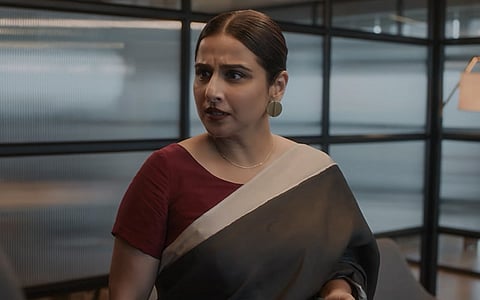
- Reviews
- Power List 2024
- Cannes 2024
- In-Depth Stories
- Web Stories
- News
- FC Lists
- Interviews
- Features
- FC SpecialsFC Specials

Director: Suresh Triveni
Writer: Prajwal Chandrashekar, Suresh Triveni, Hussain Dalal, Abbas Dalal
Cast: Vidya Balan, Shefali Shah, Rohini Hattangadi, Surya Kasibhatla, Manav Kaul, Kashish Rizwan, Shafeen Patel, Vidhatri Bandi, Mohammad Iqbal Khan, Ghanshyam Lalsa, Shrikant Mohan Yadav, Junaid Khan
Cinematographer: Saurabh Goswami
Editor: Shivkumar V. Panicker
Jalsa is a gripping and unsettling dissection of morality, motherhood, money, class and the myriad ways in which people compromise. Even those who claim to be champions of the truth. Director Suresh Triveni, who earlier made the amiable Tumhari Sulu, moves into harsher territory. Jalsa is the story of a grotesque hit-and-run accident. The aftermath alters the life of the victim, the driver and everyone around them. It peels the veneer of civility, revealing the rot within.
The idea isn't new. Tom Wolfe's bestselling 1987 novel The Bonfire of the Vanities, which was adapted into a film by Brian De Palma, offers a blistering exploration of race, corruption and greed in New York City – all of which come into sharp focus after a wealthy White man and his mistress take an accidental detour into the Bronx and run over a young Black man. Jalsa explores similar divisions of class, religion, power. But Suresh, co-screenplay writer Prajwal Chandrashekar and dialogue writers Abbas Dalal and Hussain Dalal create a more intimate drama. This film is also about the bond between women, between women and children and that sliver of humanity which binds and ultimately, saves us.
One of the joys of Jalsa is to watch three formidable female actors together – Vidya Balan plays Maya Menon, a star journalist who heads a digital news portal called Word. Shefali Shah is Ruksana, Maya's cook and mother of the victim Aliya. And Rohini Hattangadi is Maya's mother, who lives with her and helps to keep her home running, along with Ruksana, so that Maya can pursue her demanding career. Maya, at least outwardly, is like Sherman McCoy from The Bonfire of the Vanities – wildly successful and a master of her universe. Early in the film, we see her making a guest visibly uncomfortable on camera. She enjoys her power and has what Sanjay Mishra's character in Newton described as 'imaandari ka ghamand.' All of which comes apart as the plot unravels.
In No One Killed Jessica, Rani Mukerji played the role of the firebrand journalist while Vidya was milder and less flamboyant as the sister of the victim. Here, she takes centerstage. Hindi cinema's idea of how journalists work has always been divorced, to varying degrees, from reality. In Jalsa too, Maya's sprawling house, the billboards with her face spread across Mumbai, even the expansive offices of her news portal seem a tad fantastical. Most journalists can only dream of that level of stardom, power and money.
But thankfully, this doesn't take away from the disturbing emotional reality of the film. Suresh stages the accident with skill. As 19-year-old Aliya and her equally young male friend loiter, flirt and fight on the ramp bridge leading to the train station, there is an increasing sense of dread. And yet, the impact of car on girl is so sudden and shocking that it makes you jump.
This collision is a literal rendition of the various divisions that are consistently colliding through the film. For starters, class and religion which separate Maya and Ruksana. Both are working mothers. Maya's affluence enables her to set up an elaborate monitoring system – her house has cameras that allow her to watch her son Ayush from the office. Ruksana doesn't have this luxury. So when her daughter gets hurt, the blame falls on Ruksana – after all, why was such a young girl out so late at night? More than once, it is suggested that by transgressing, she asked for it.
The film isn't shrill in calling our attention to the difference between Maya and Ruksana's circumstances. Instead, every interaction underlines how disparate their worlds are. There is a lovely moment in which Ruksana's son, who often comes to Maya's house, fools around with the motion sensor flush in the toilet. He's amused by the toys rich people can buy. The power dynamic between the two women also keeps shifting. Both are equally fierce.
Maya isn't consistently heroic. She sells the truth but when she is caught in the crosshairs herself, she becomes a coward. She can be unreasonable and hurtful, but also, vulnerable and broken. Vidya doesn't hesitate to make Maya unlikeable but she navigates Maya's nuances with such conviction that she makes it difficult for us to pass easy judgements. But the standout is Shefali, wounded and raging. Watch her expressions in a scene in which a neighbor, visiting at the hospital, pointedly asks why her daughter was out at that time. You can almost feel Ruksana's fury through the screen.
Jalsa's screenplay wobbles in the second hour. There are plausibility issues in the track involving a new reporter at Maya's portal, Rohini George, who is hell bent on solving the hit-and-run case. And I wasn't entirely satisfied or convinced with Maya's decision in the climax.
But Suresh and his team – editor Shivkumar V Panicker, cinematographer Saurabh Goswami, music composer Gaurav Chatterji – and the solid cast including Surya Kasibhatla, Shrikant Yadav and Manav Kaul in a cameo, manage to steer the film over these bumps. Jalsa is a taut and tense ride.
You can watch the film on Amazon Prime Video.